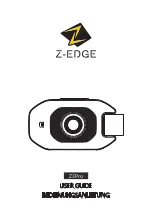
38
Camera Performance and Features
Linea ML Color Cameras
With a white balance ROI, the camera looks at a user-designated region of interested, performs the
white balance calculations based on those regions, and applies the appropriate corrections across
the whole image.
Adjusting Flat Field Calibration Coefficients
See the section Flat Field Category in Appendix A for GenICam features associated with this section
and how to use them
Relevant Features:
flatfieldCorrectionCurrentActiveSet
Further, applications may also have several different lighting conditions each requiring their own
flat field coefficients and the means to quickly and easily switch between them. To this end, the
following features are provided:
The ability to save and load user PRNU coefficients independent of a user set that contains
all adjustable parameters.
We recommend that before saving custom PRNU profiles you first save all the current camera
settings using the Camera Information > Settings feature. The Save User PRNU set only stores the
revised PRNU coefficients in the desired User Set.
These new features are found under the Flat Field tab and are only visible in Guru mode. Press
“More >>” in CamExpert to display the full list of parameters.
Saving & Loading a PRNU Set Only
Loading a user set takes approximately 800 ms while loading only the user PRNU coefficients takes
less than 200 ms.
Use the User PRNU Set Selector parameter to select the set you want to save or load. (There are
17 sets available—16 user and one factory.) Loading the Factory Set is a good way to clear just the
user PRNU.
Save the current user PRNU coefficients with the “Save User PRNU Set” feature. Load the user
PRNU coefficients from the set specified with “User PRNU Set Selector” and with the “Load User
PRNU Set” command feature.
Setting Custom Flat Field Coefficients
There may also be circumstances when the user wants to upload their own Flat Field (PRNU)
coefficients. Flat Field coefficients can be custom modified and uploaded to the camera. They can
also be downloaded from the camera.
To download and upload PRNU coefficients, use File Access Control Category > Upload / Download
File > Settings and select Miscellaneous > Current PRNU to download / upload a file. The file
format is described in 03-084-20133 Linea ML Binary File Format which can be obtained from
Teledyne DALSA Technical Support. This document also includes Excel spread sheet examples.
Once the PRNU coefficients are uploaded, they are used immediately by the camera. To avoid loss
at power up or changing row settings, they should be saved in one of the 8 available user sets.
Summary of Contents for ML Series
Page 16: ...14 The Linea ML Color Camera Linea ML Color Cameras Mechanical Drawings ML FC 08K10T 00 R ...
Page 17: ...Linea ML Color Cameras The Linea ML Color Camera 15 ML FC 16K04T 00 R ...
Page 18: ...16 The Linea ML Color Camera Linea ML Color Cameras ML HC 16K10T 00 R ...
Page 80: ...78 Declaration of Conformity Linea ML Color Cameras Declaration of Conformity ...
















































